10 Dec 2018 | Digital Freedom, Fellowship, Fellowship 2017, News and features, Sri Lanka, Turkey
[vc_row][vc_column][vc_single_image image=”104234″ img_size=”full”][vc_column_text]“Internet shutdowns are increasingly used by governments to control the flow of information, particularly around elections or political unrest,” Alp Toker, executive director and founder of the NetBlocks group, told Index on Censorship.
NetBlocks, which grew out of the 2017 Freedom of Expression Digital Activism Award-winning Turkey Blocks, is a nonprofit organisation created in 2016 to harness technology to map internet freedom. The civil society group aims to protect and support digital rights, cyber-security and internet governance.
“The goal is to go beyond research into prototyping, implementation and deployment of completely new mechanisms that might be able in future to protect and extend our fundamental rights,” Toker said.
NetBlocks has partnered with the Internet Society to create a new tool, Cost of Shutdown Tool (COST), that will cover social media and key content platforms, as well as full internet blackouts.
“What’s the cost of censorship? How much do internet shutdowns cost ordinary citizens? These are the questions we set out to answer at NetBlocks with COST, because traditional advocacy around freedom of expression doesn’t always make the impact it should, but financial figures make authorities listen,” Toker said.
The COST tool has been in a beta mode throughout 2018. NetBlocks estimated a loss of £23.7 million from the March 2018 Sri Lankan internet shutdowns that took place in response to violent riots.
COST’s main goal is to spread awareness about the true costs and effects of online shutdowns. The NetBlocks teams hopes that this will prompt citizens to put pressure on the authoritarian governments who are most responsible for online censorship.
Gillian Trudeau from Index on Censorship spoke to Alp Toker about NetBlock’s new tool, COST, and what to expect from it.
Index: What is the Cost of Shutdown Tool (COST) and what does it do?
Toker: What’s the cost of censorship? How much do internet shutdowns cost ordinary citizens? These are the questions we set out to answer at NetBlocks with COST, because traditional advocacy around freedom of expression doesn’t always make the impact it should, but financial figures make authorities listen.
The Cost of Shutdown Tool (COST) is a data-driven online tool to quickly and easily estimate the economic cost of internet disruptions. Built around economic methodologies devised by the Brookings Institution and CIPESA, the Cost of Shutdown Tool (COST) estimates economic cost of internet shutdowns, mobile data blackouts and social media restrictions using regional indicators from the World Bank, ITU, Eurostat and U.S. Census. The tool will cover shutdowns affecting social media, key content platforms and full Internet blackouts using key indicators relating to the global digital economy. COST is officially launching Monday 10 December, 2018.
Index: What do you hope to achieve with the project?
Toker: We hope to enable anyone – including journalists, researchers, advocates, policy makers, businesses — to understand how much internet disruptions can cost economies, as well as support advocacy and policy work to end online mass-censorship.
Index: How did your relationship with the Internet Society start and what do they bring to the project?
Toker: The Internet Society (ISOC) is a global organisation with over one hundred chapters around the world dedicated to ensuring that the internet stays free and open. We connected at the Internet Engineering Task Force where we are working to strengthen internet protocols for human rights, and things immediately clicked. The partnership has been very strong because it is built around both impact around human rights and technological development — areas of expertise for both organisations. With the Internet Society’s global access, we’ve been able to explore new ways to identify and push back against internet disruptions that harm human rights around the world.
Index: Why should we be concerned about internet shutdowns?
Toker: Internet shutdowns are increasingly used by governments to control the flow of information, particularly around elections or political unrest. Internet shutdowns create chaos through all facets life, from accessing medical services to getting in contact with family members.
Through our work in the #KeepItOn campaign, we’re continuing to monitor these shutdowns around the world. Open access to internet is a key part of a functioning democracy, and is protected by international law and conventions.
Index: What cost estimates do you have for internet shutdowns in 2018?
Toker: In it’s beta mode, the tool has already been used to bolster advocacy efforts around the world. Our first experience using the tool in advocacy came when Sri Lanka shut down parts of the internet during protests, leading to an estimated loss of $30,000,000 USD. Because we were able to calculate the number instantly, it became the basis of a national campaign launched by Sri Lanka’s Social Media User’s Union. In Iraq, multi-day outages cost the economy an estimated $40,000,000 USD. Again, this figure was picked up widely by local and international media and caught the attention of everyone from street vendors to the oil industry. Another shutdown in Ethiopia had a more modest impact of 3,500,000 birr, but that impact targeted a small region with a developing economy and its impact was felt hard. Working with the #KeepItOn coalition, we wrote to the Ethiopian government to highlight the concern with their policy.
Index: What trends in internet shutdowns can we expect COST to uncover in 2019?
Toker: There is a growing tendency toward mass-censorship online, particularly in developing countries. We’ve been seeing more localised disruptions, and COST is now able to estimate the impact of sub-national shutdowns — a powerful approach that highlights the economic impact to a local community.
We have also seen more precisely timed shutdowns, intended to evade detection and reporting. For these reasons, COST works best when there is hard technical evidence of an internet disruption. Hence, it works great in tandem with real-time monitoring data from the NetBlocks internet observatory, which uses new techniques to accurately track such incidents.
In addition, research shows little evidence that cutting off communications provides relief in these situations, but it has been shown again and again that shutdowns do impact emergency first-response, healthcare and the provision of critical service. This is in addition to their severe impact on the fundamental rights of free expression, free assembly and free association.
Index: What are the worst and best countries for internet freedom and why?
Toker: Pakistan and India face systematic disruptions at massive scale, and the problem is also endemic in sub-Saharan Africa. There are also frequent disruptions in the Middle East, and a new trend emerging of shutdowns in Central America.
Index: When was the NetBlocks group created?
Toker: The idea for NetBlocks came about in 2015 and was recognisable in its current form by 2016. We entered the spotlight in 2017 after the first two modules of the internet observatory was launched. Meanwhile, The Index on Censorship Award helped us focus at a critical moment in time with a backdrop of contested elections, overbearing corporations, and the breakdown of online trust. In a time of rapid change the fellowship gave us a way to channel creative energy into a force for good.
Index: Why was the NetBlocks group created?
Toker: NetBlocks exists to meet the overwhelming need and demand for rights-based technology in support of free expression and access to knowledge. The goal is to go beyond research into prototyping, implementation and deployment of completely new mechanisms that might be able in future to protect and extend our fundamental rights. Internet-scale measurement, data-driven policy and advocacy, rights-based internet protocol design, machine learning to uncover violations of fundamental rights: these are some of the new frontiers. I’m sure there will be more.
There are competent civil society technology programmes out there today, but why not shake things up and put the tech at the forefront of the mission? Journalism, writing, the creative arts now exist largely in digital spaces, more vulnerable than at any time in our history. We need to not only understand those spaces, but to master them if we’re to stand a chance defending free thought for the next generation.[/vc_column_text][vc_basic_grid post_type=”post” max_items=”4″ element_width=”6″ grid_id=”vc_gid:1544461258021-a4fe0eae-9690-2″ taxonomies=”9034″][/vc_column][/vc_row]
8 Dec 2017 | Campaigns -- Featured, Digital Freedom, Fellowship, Fellowship 2017, Statements, Turkey, Turkey Letters
[vc_row][vc_column][vc_column_text]
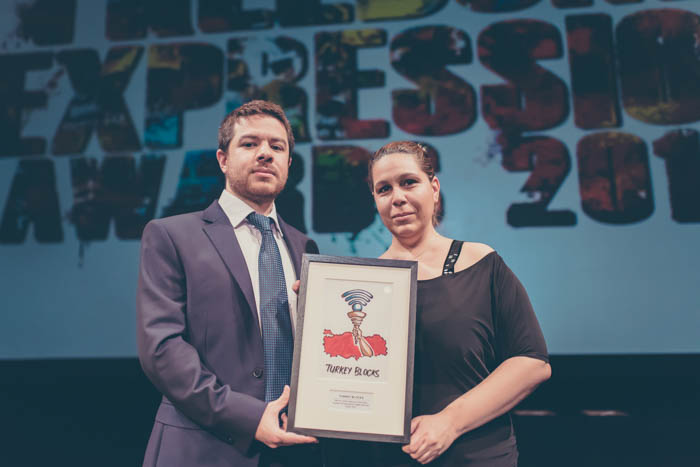
Alp Toker and Isik Mater of Digital Activism Award-winning Turkey Blocks at the 2017 Freedom of Expression Awards (Photo: Elina Kansikas for Index on Censorship)
“We send a unified message to those who seek to silence independent voices: as long as freedom of expression and digital rights are not safeguarded, our mission will continue and we will persist.” – Alp Toker, co-founder Turkey Blocks, 2017 Digital Activism Fellow
Silence is the oppressor’s friend. Targeting those who speak out against corruption and injustice is the favoured tool of those who seek to crush dissent. Don’t let the bullies win – help us champion the people who are fighting back. People like Freedom of Expression Awards fellows Turkey Blocks.
With your help, each year we are able to support writers, journalists and artists at the free speech front line – wherever they are in the world – through Index Fellowships. These remarkable individuals risk their freedom, their families and even their lives to speak out against injustice, censorship and threats to free expression.
I am writing now to ask you to support the Index Fellows. Your donation provides the support and recognition these outstanding individuals need to ensure their voices are heard despite the restrictions under which they are forced to live and work.
Your support will help winners like Turkey Blocks, who continue to work hard to track and battle internet outages around the world, trying to ensure that they “make technology a force for good” says Alp Toker, founder.
The team, working under the new name Net Blocks, have most recently been developing a new tool COST, which calculates the financial impact of mass-censorship, “a very powerful method for convincing governments not to censor content”. Index will help them to launch COST in 2018. Meanwhile, in a “quite historic” meeting, they sat down with the internet blocking authority of Turkey. “I think that it’s just great that we’re able to have some dialogue, because things in Turkey are very polarized right now. Normally it’s like oil and water—you can’t even exist in the same space” says Toker.
Alp Toker says the Index Awards Fellowship has made them feel “valued, recognised and befriended” and co-founder Isik Mater says “I can feel that if something bad happens to me or my colleagues, Index will be there to support us”.
I hope you will consider showing your support for free speech and the Index Fellows. A gift of £500 would support professional psychological assistance for a fellow; a gift of £100 helps them travel to speak at more public events. A gift of £50 helps us to be available for them 24/7. You can make your donation online now.
Please give what you can in the fight against censorship in 2018. Make your voice heard so that others can do the same.
Thank you for your support.
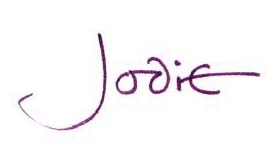
Jodie Ginsberg, CEO
P.S. The 2018 Index on Censorship awards will be held in April. To find out more about the awards including previous winners, please visit: https://www.indexoncensorship.org/awards
Index on Censorship is an international charity that promotes and defends the right to free expression. We publish the work of censored writers, journalists and artists, and monitor, and campaign against, censorship worldwide.[/vc_column_text][/vc_column][/vc_row][vc_row][vc_column][vc_basic_grid post_type=”post” max_items=”12″ style=”load-more” items_per_page=”4″ element_width=”6″ grid_id=”vc_gid:1512726349609-d7244289-6e40-2″ taxonomies=”9034″][/vc_column][/vc_row]
9 Nov 2017 | Asia and Pacific, Awards, China, Europe and Central Asia, Fellowship, Fellowship 2017, Maldives, News and features, Russia, Turkey
[vc_row][vc_column][vc_column_text]
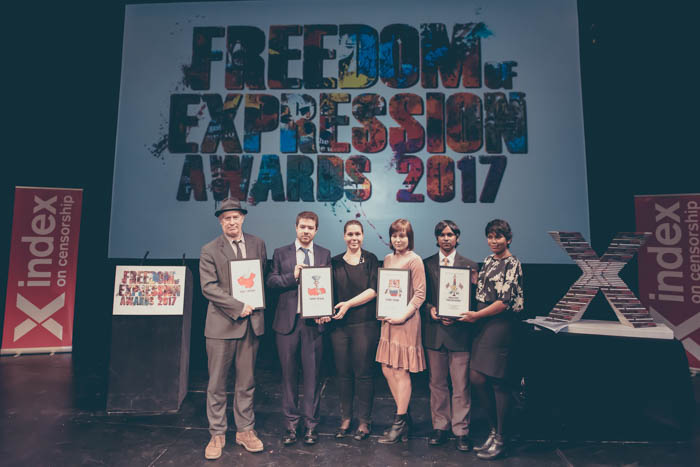
From left: Cartoonist Martin Rowson accepting the Arts Award on behalf of Chinese cartoonist Rebel Pepper; Alp Toker of Digital Activism Award-winner Turkey Blocks; Isik Mater of Digital Activism Award-winner Turkey Blocks; Anastasia Zotova, wife and campaign partner of Campaigning Award-winner Ildar Dadin; Ahmed Naish, deputy editor of Journalism Award-winning Maldives Independent; Zaheena Rasheed, former editor of Journalism Award-winning Maldives Independent. (Photo: Elina Kansikas for Index on Censorship)
Since the Index on Censorship Awards, the 2017 fellows have been busy doing important work in their respective fields to further their cause and for stronger freedom of expression around the world.
Rebel Pepper / Arts

Baby Pepper
Rebel Pepper, the Chinese cartoonist critical of the country’s government, now lives in exile in the USA where he works for Radio Free Asia. “Everything is going well, and I have a lot of friendly colleagues who like my work,” he told Index on Censorship.
He also continues to write his column in the Japanese version of Newsweek and worries about many recent developments in his home country. “The CCP’s control of society is becoming more and more severe, people are exposed to less and less real news from the outside world, and vice versa,” he says. “It’s hard to sum up because there are so many problems right now.”
The artist is still getting cartoons published and says the Index on Censorship award gave him the energy to “keep walking on the creative road”.
There is a new addition to the Rebel Pepper family, with baby Kitano. “Every day I have to change a lot of diapers, which has had a big influence on my sleeping patterns, so I have to find some fun from him,” Rebel Pepper tells Index, brandishing a cartoon to illustrate his point.

Idler Dadin / Campaigning
Campaigning fellow Ildar Dadin has returned to activism since his release from prison in February. “Along with friends or on single pickets, we are openly showing that we aren’t in agreement with what’s happening in the country,” Dadin tells Index.
Last month he was detained in St Petersburg while trying to film a woman being assaulted by police. “The situation in this country now is really bad,” Dadin says. “There’s a new kind of police force which can attack and humiliate people, which is very serious.”
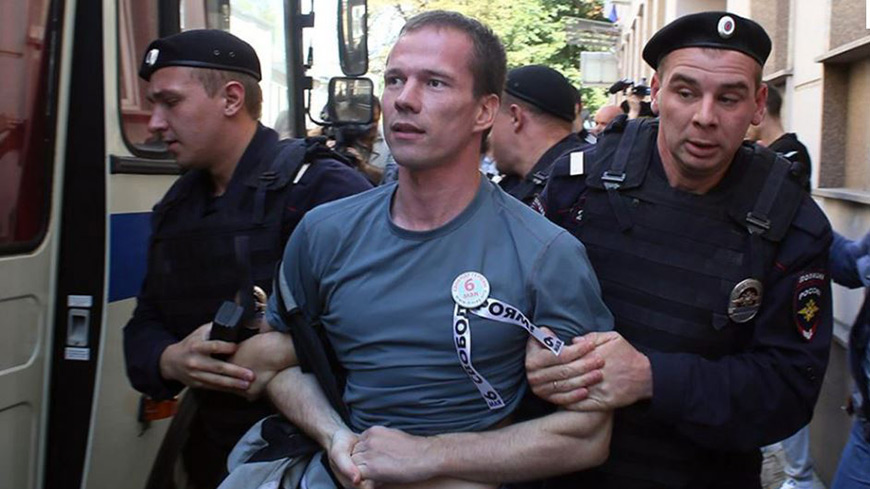
He describes the arrests of more than 260 people during anti-Putin protests across Russia — including St Petersburg — in October as “pretty much normal for any activist in the country”.
Dadin believes that pressure from civil society both in Russia and abroad were partially responsible for his release. He hopes for “justice for all people, not just Russians”.
Moving forward, Index is helping Dadin with his transition to life outside of prison and prioritising his health and also helping him to gain additional international exposure.
Turkey Blocks / Digital Activism
“We are now going to be the NetBlocks project and expand our work,” director of research at Turkey Blocks Isik Mater tells Index. The team are taking steps to formalise some of their tools and methodologies, expand into new regions that have similar needs and now cover several countries experimentally.
The Turkey Blocks team have also developed a new tool called Cost, which calculates the financial impact of mass-censorship. “Governments don’t tend to care about the human rights argument, so they don’t listen to it,” says Alp Toker, founder of Turkey Blocks. “But if you tell them ‘this will cost x million dollars of harm to GDP’ then they perk up because that can become a political issue, which is a very powerful method of convincing governments not to censor content.”
Turkey, however, has been quite quiet recently in terms of internet shutdowns, after a barrage of such incidents in the year following the attempted coup in July 2016. In fact, the Turkish government have been using Turkey Blocks data on internet shutdowns as a kind of audit, Toker explains. “We ran our first panel with the Turkish government just a few weeks ago, which is kind of historic,” he says. “We are seeing really positive things, and although they have a long way to go it should be noted that they’ve been willing to have a dialogue with civil society and with a human rights group.”
Index on Censorship is helping Turkey Blocks through the process of forming a board and incorporating public speaking training skills for Mater so that she too can begin to make more public appearances.
Maldives Independent / Journalism
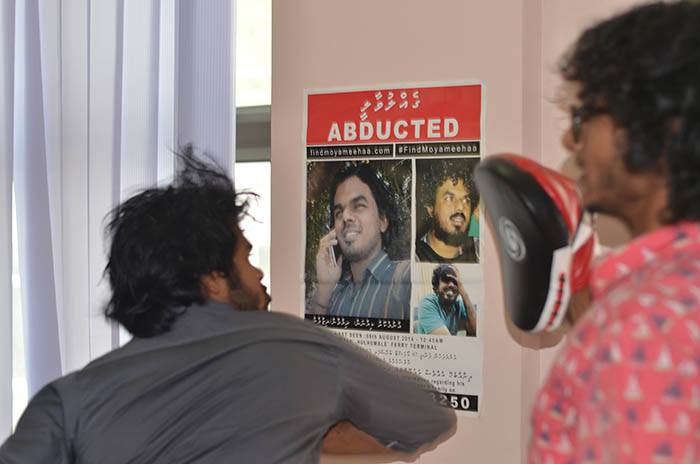
Staff at the Maldives Independent taking part in self-defence training.
Journalism fellows at Maldives Independent are going through a period of change. Former editor Zaheena Rasheed left the publication soon after awards week in London to take up a position on the online team at Al Jazeera, where she has recently been doing a lot of work covering the Rohingya refugee crisis from Bangladesh.
For personal reasons, Rasheed finds it difficult to be involved with the Maldives on top of this. “A friend of ours in the Maldives, Yameen Rasheed, was murdered at the end of the Index awards week in London and that was a big blow — it was very hard for me.”
Yameen Rasheed was a prominent blogger and internet activist who died from multiple stab wounds after an attack in the stairway of his apartment building in Malé on Sunday 23 April 2017. Index on Censorship has been involved in helping the Maldives Independent better secure their personal and office safety since Yameen Rasheed’s murder, including a recent self-defence training session.
A new editor took over at the Maldives Independent in mid-September and since then the publication has seen a noticeable spike in readership, and reporters are encouraged to get out and meet people, build relationships and contacts.
“It’s fairly calm at the moment — there have been no coups, for example — so I see this period as a time to hone the team’s reporting and feature writing skills,” a staff member tells Index. “We’re doing a broad mix of news and features: politics, tourism, mental health, rave culture, the hipster coffee scene, rural development, sex abuse cover-ups.”
Staff at the Maldives Independent hope that the publication continues to be a forum for debate and free speech, that it holds power to account, exposes wrongdoing and corruption and most of all give insight into a country that many people have only one image of.
[/vc_column_text][/vc_column][/vc_row][vc_row][vc_column][vc_basic_grid post_type=”post” max_items=”4″ element_width=”6″ grid_id=”vc_gid:1510228913303-fd0d57c2-b760-1″][/vc_column][/vc_row]
28 Jul 2017 | Awards, Fellowship, Fellowship 2017, News and features, Turkey
[vc_row][vc_column][vc_single_image image=”89666″ img_size=”full” add_caption=”yes” alignment=”center”][vc_separator color=”black”][vc_column_text]Digital Activism award-winner Turkey Blocks continues to monitor internet freedom in Turkey. Since the Index on Censorship Freedom of Expression Awards, Turkey Blocks has expanded its use of NetBlocks, a programme which they use to track internet freedom and the flow of information online, as well as studying the impact of censorship.
Established in 2015, Turkey Blocks has served as a platform to monitor and report internet shutdowns using an open source tool it developed, which has been adopted by other organisations. With this tool, it has exposed 14 instances of mass-censorship.
Beyond monitoring internet freedom, Turkey Blocks has been campaigning using the information it gathered. According to founder Alp Toker, “We’ve put the spotlight on compliance by western corporations – elective censorship, withholding of content and geoblocking – particularly as it affects vulnerable communities in Turkey.” Staff have also been analysing the financial impacts of mass-censorship incidents. “Increasingly we find that economic criteria can succeed where human rights arguments are ignored,” Toker said.
Turkey Blocks is campaigning to make the internet more accessible from the policy side too, by gaining representation in bodies that define internet standards to “…ensure that human rights considerations are built into core infrastructure”, Toker told Index.
“The Freedom of Expression Award came at a time when Turkey faced unprecedented challenges to civil liberties and human rights. The recognition draws attention to our struggle to defend the online spaces citizens need to think freely and speak out,” Toker said. Index has connected Turkey Blocks with other human rights groups and communities that share similar goals of internet freedom.
Toker highlighted the Turkish government’s blocking of Wikipedia as a pressing concern for digital freedom in the country. Governments are unable to block individual pages, and on 29 April Turkey Blocks reported a full block of Wikipedia, which is ongoing. Toker calls this block “the ultimate act of digital self-harm…Turkish citizens are no longer able to edit articles with their own worldview; instead, they are left to watch from a distance as the international community picks up editorial control of Turkey’s history, culture and politics, defining the geopolitical narrative today and for generations to come.”
Moving forward, Turkey Blocks will work at using their measurement systems to empower ordinary citizens and independent media. “Our recent work has focused on bridging the terminology and requirements of the media freedom community with capabilities and expertise in the information security space,” Toker said.
“We’ve found that the mere act of systematic observation and record-keeping can discourage mass-censorship,” Toker told Index, so the team is working on scaling up to cover a wider geographic area, as well as pinpointing small disruptions.
From travelling and speaking at conferences, Toker emphasized that Turkey’s internet regulations are not that different from the rest of the world. “Our message on the international track is that the media freedom community needs to move faster to keep pace with innovation; it will be difficult, after all, to reclaim those spaces and win back those rights if we let go of them now.” He is adamant that digital rights are essential to other human rights, “Digital rights can seem abstract, even distant, in the context of Turkey’s national state of emergency, with ever-tightening restrictions around journalism and civil society. Yet none of those conversations can take place without a free and open internet. It’s important now, more than ever, to keep watch and to keep calling for more digital transparency and accountability from the authorities.
Additional reporting by Margaret Flynn Sapia[/vc_column_text][/vc_column][/vc_row][vc_row][vc_column][vc_basic_grid post_type=”post” max_items=”12″ style=”load-more” items_per_page=”4″ element_width=”6″ grid_id=”vc_gid:1503400925088-42244ba1-c62c-10″ taxonomies=”9034″][/vc_column][/vc_row]







